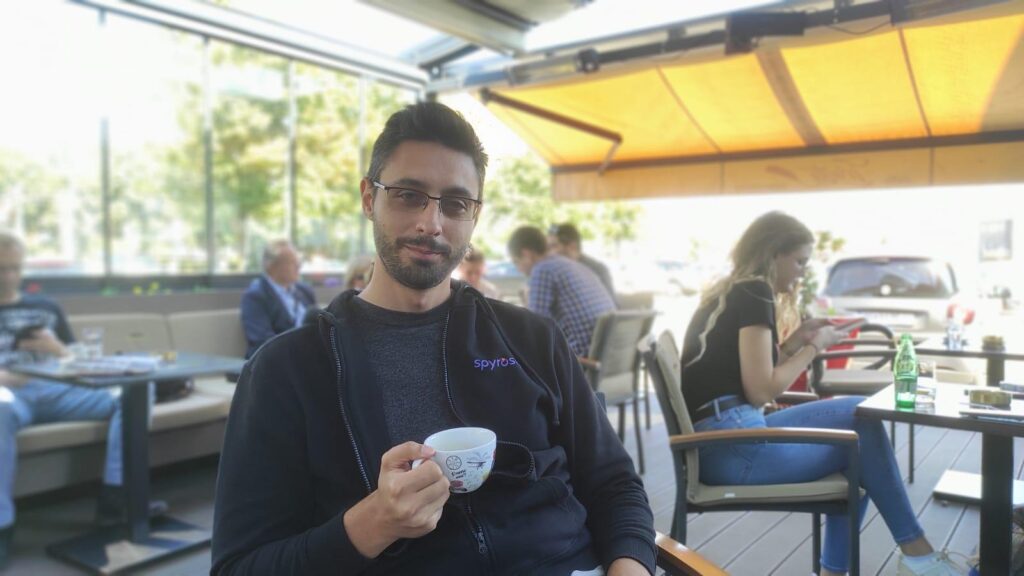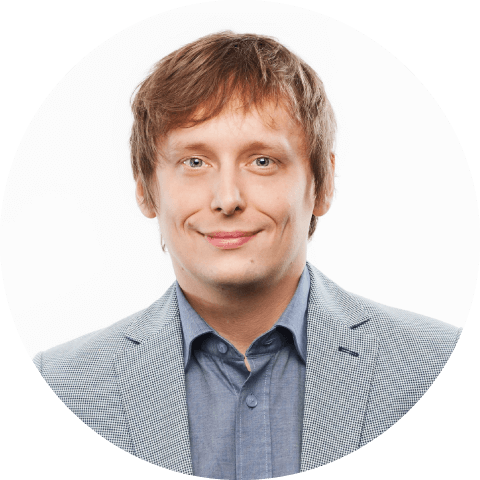What will change in the cloud in 2022: an interview with our Head of Cloud Engineering
In this instalement of our #SpyrosoftPeople, we’re introducing Lukasz Marcinek who works as a Head of Cloud Engineering at Spyrosoft and is currently based in Krakow, Poland.
How did you get into cloud technologies? What has your career path been so far?
I was working with Microsoft technologies a lot right from the start, i.e. on ERP or CRM systems. I stumbled upon the cloud for the first time a few years ago – when I was developing a large cloud platform with a CMS for an online event ticketing system. I started digging deeper and getting to know different services, mostly from the Azure range. Working on different projects, already at Spyrosoft – these were not only CMS systems but also custom application built for our clients – I had a chance to grow as a Senior Developer and then as a Tech Lead. I started exploring the cloud from the service perspective – starting with web applications to more difficult projects using microservices and Kubernetes. I started expanding my knowledge, reading a lot more. That’s also when I began reflecting on what value the cloud can really add – working on different project is one thing, but how this work addresses the client’s business needs is another. I’ve noticed that the cloud can make a lot of things easier and once you know it thoroughly, it can resolve a large portion of issues that our clients approach us with.
When Marcin Zyga [CTO at Spyrosoft S.A) announced the idea of building technology verticals within the company, I contacted him to ask how I might help. This is how our collaboration began and now, I’m the Head of Cloud Engineering building my own tech department.
How have you been building out the cloud engineering domain and how have you been growing your team?
It changes a lot, but there are a few concepts that we have been building on. This year, our focus has been on analysing the demand for cloud services within Spyrosoft. We’ve quickly realised it’s exponential and we won’t be able to meet it with a small team.
We’ve also checked how many of our tasks are consulting where we advise people from other teams on how to develop cloud solutions, and how many of them are focusing on particular projects. We concluded that at times, we zero in on organising work in the cloud, but some projects are just too big, and they need people who will be able to focus on them 100%. Next year, we’ll organise a series of pre-project workshops where we’ll train our developers who have never worked with the cloud before in how to address the needs of our projects. During these workshops, we will show them how to move around in the cloud, what they can do and what challenges they may face later on. This will be perfect for learning more about the cloud and then applying this knowledge to a particular use case.
We also build Cloud Community of Interest where we organise talks on various elements of the cloud, different services and interesting cloud-related concepts. Every employee can join these meetups or present their ideas.
I often jokingly say that the main aim of my department is for it to be no longer necessary. We want to pass on what we know to the developers, so they no longer need to consult our team. That’s why in 2022, we will be focused on consolidating our competences. We want to have more experienced cloud architects within our organisation, so we can even better address our clients’ needs.
What do you focus on when recruiting new people?
Currently, we’re in the process of auditing what competences we already have within our organisation and so far, I know that I’d like to hire someone who could fill the role of a Cloud Native Architect and serve as a consultant for our teams when it comes to Kubernetes, containerisation, and the cloud solutions suppliers’ native services.
We’re also looking for Data Engineers that could work in a similar way. These are the roles that we’re already recruiting for and will be recruiting for in the near future. Our organisation is growing and the demand will be increasing as well – we want to stick to sharing what we know nevertheless.
When it comes to what I’m looking for while recruiting, I always search for people who not only know the cloud through and through, but also have soft skills – first and foremost, know to talk to the clients. Our consulting services are not limited to sharing what we know in-house. As cloud architects, we also support our customers as they introduce the cloud in their companies, and serve as technical advisors. These persons need to be very communicative and just know what to hold a discussion. They also need to be able to understand the challenges the clients face and advise them.
We’re moving further and further into the direction of consulting that have become immensely popular these days. We use Cloud Adoption Framework which suggests how to properly implement the cloud within any given organisation. So, we not only advise on software architecture where we identify services that need to be used, but we also focus on resolving operational challenges, including paying for the cloud services. We already have a few projects where we advise our clients on how to manage their cloud solution when it comes to access, application implementation and cost optimalisation.
How will the cloud technology be changing the next 2 – 3 years?
Various approaches to the cloud such as FinOps, DevSecOps and DataOps are becoming increasingly more popular. The cloud is not only about the infrastructure – we need to take other domains into account. There will be an extra focus on security solutions in the cloud that allow us to safely implement applications in the cloud.
This first approach is FinOps I’ve mentioned when discussing Cloud Adoption Framework above – managing your cloud services costs. We are now able to suggest our customers how to resolve the challenge of budgeting and invoicing cloud services for multiple company departments at once. This will play a role in large organisations where many teams work in the cloud at the same time.
DataOps is also more and more popular, because the cloud was made for processing a lot of data. Hence the term ‘DataOps’ that refers to the culture of processing and storing data in the cloud. When you have systems that store terabytes or petabytes of data which we need to implement reporting for, make sure that you know how to take care of your data in the cloud.
These are the areas and domains that we’ll see becoming more visible in the next months, but we’ll also experience growth when it comes to AI/ML solutions and MLOps approach. MLOps refers to using best practices, especially those from the DevOps area, to implement and monitor production-ready Machine Learning models. By using certain frameworks and processes we can shorten the time necessary to prepare new versions of these models and their production usage.
About the author
RECOMMENDED ARTICLES




